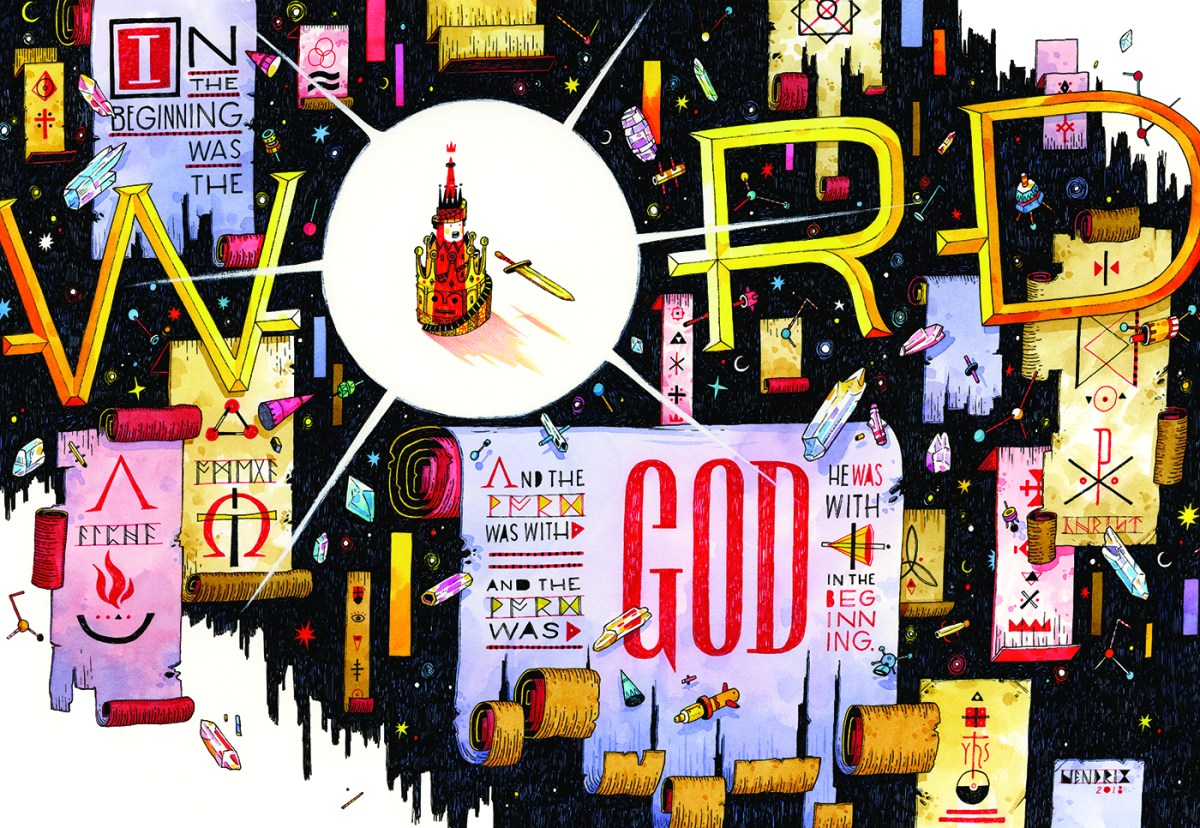English readers have access to more translations of the Bible than readers of any other language. The American Bible Society estimates that there have been around 900 full and partial biblical translations into English. Naturally, that staggering number isn’t readily available, but you can easily order more than 50 different translations in your favorite bookstore, and many more can be found in used bookstores and libraries.
These numbers bear witness to the remarkable treasure available to English readers, a uniquely rich and multilayered resource for gaining fresh insights into the Word of God.
Translations are produced with different methods and goals. Some versions—particularly the “mainstream” ones such as the New International Version, the English Standard Version, the New Revised Standard Version, the Christian Standard Version, or the New American Bible—were carried out by large committees. And while they each have specific reading levels in mind, they generally try to be acceptable to all potential readers.
Other translations have specific readers in mind—Native Americans, British youth, literature enthusiasts, and so on. And still others have “celebrity” names attached to them, such as recent translations by scholars N. T. Wright and David Bentley Hart. These tend to be lesser known, but because of their unique audiences (and authors), they can bring new perspectives into particular passages.
Let me introduce ten of these by showcasing the riches of John 1:1–5 and Luke 22:14–19 in each translation. My hope is to pique your sense of adventure to seek out these or other translations and immerse yourself in them.
All but one of these versions were translated by individuals. Although the church likes to celebrate individual historical Bible translators (think Jerome, Tyndale, Luther, Jan Hus, or Robert Morrison), widely used Bible translations in most languages are typically translated by committees for good reasons. Carefully weighed compromises, as painful as they might be for the individual, are useful and necessary when working on something as important as Bible translation, particularly when it comes to efforts that involve many different denominations or even confessions. So this is certainly not an attempt to persuade readers to stop using those mainstream translations.
Of course, brief excerpts hardly give one the full flavor of these translations. A practice I’ve followed is to immerse myself in one translation a weekend, reading one Gospel straight through. It takes an hour or two. I change up the Gospel and the translation every weekend. When I started this, I found myself looking forward to the weekend. Even though I’m familiar with the Gospels, I never quite knew what to expect. It startled me and enriched my understanding every time.
When it comes to having access to a richness of Bible translations, no other readers of the 7,000 or so world languages are as privileged as English readers. So why not use that resource? Will some translations fail to “speak” to you? Absolutely. But translators themselves understand that there is value in variety. In the original preface to the King James Version of 1611, its translators wrote “that varietie of Translations is profitable for the finding out of the sense of the Scriptures.”
7 translations of John 1:1–5
1.
In the beginning the Word was. And the Word was with God, And the Word was God. He was with God in the beginning. All things came to be through him, And without him not one came to be. What came to be in him was Life; And Life was the Light of mankind. And the Light is shining in the Dark: And Dark did not conquer it. E. V. Rieu, The Four Gospels, Penguin Classics, 1953.
E. V. Rieu had just started to head the newly founded Penguin Classics series that published his own translation of The Odyssey, a smashing success. Spurred on by that success, he had originally hoped to have the whole Bible translated, but he was eventually able to publish only his own translation of the Gospels and his son’s translation of Acts (1958). In the spirit of the Penguin Classics series (“to commission translators who can emulate his own example and present the general reader with readable and attractive versions of the great writers’ books in modern English, shorn of the unnecessary difficulties and erudition, the archaic flavor and the foreign idiom that renders so many existing translations repellent to modern taste”), he translated the Gospels into an accessible, yet weighty literary style.
Here’s his description of his emotional response during his Gospel translation in a recorded discussion with J. B. Phillips: “My work changed me. And I came to the conclusion, as I said, I think, in my Introduction, that these works bear the seal of the Son of Man and God. And they are the Magna Carta of the human spirit.”
2.
At the beginning God expressed himself. That personal expression, that word, was with God, and was God, and he existed with God from the beginning. All creation took place through him, and none took place without him. In him appeared life and this life was the light of mankind. The light still shines in the darkness and the darkness has never put it out. J. B. Phillips, New Testament in Modern English, Touchstone, 1996 (orig. 1958).
J. B. Phillips, a pastor in London during World War II, was encouraged by C. S. Lewis to press on with his translation work. He started working on his version in the bomb shelters during the German air raids to offer an understandable translation to young people in his church.
3.
In the beginning was the word, and the word was with God, and the word was God. The same was in the beginning with God. All things were made by it, and without it was made nothing that was made. In it was life, and the life was the light of men. And the light shines in the darkness, but the darkness comprehended it not. William Tyndale and Ruth Magnusson Davis, The October New Testament, New Matthew Bible Baruch, 2016.
Tyndale’s translation, to which the King James Version translators were most indebted, was picked up in the 21st century by Ruth Magnusson Davis. She attempted to render it into modern English while leaving the particular style and terminology that made Tyndale so influential—and controversial. For instance, see the use of “congregation” for ekklesia in Matthew 18:17 in the new and old editions: “If he does not hear them, tell it to the congregation. If he does not hear the congregation, take him as a heathen man and as a publican.” Some readers preferred church, which suggests the universal church and also the Catholic hierarchy; Protestants preferred to emphasize the authority of the local gathering of Christians.
4.
In the beginning the Word existed; and the Word was face to face with God; yea, the Word was God Himself. He is the One who was face to face with God in the beginning. It was through Him that everything came into existence, and apart from Him not a single thing came into existence. It was by Him that life began to exist, and that light was the light of mankind. So the light continues to shine in the darkness, for the darkness has never overpowered it. Charles Williams, Williams New Testament: In the Language of the People, Sprawls, 2016 (orig. 1946).
Charles Williams was a Greek professor and administrator at various colleges and an interim pastor in various churches. His translation “used practical everyday words, to replace many technical, religious, and theological terms . . . that are understandable by the farmer and the fisherman, by the carpenter and the cowboy, by the cobbler and the cab-driver, by the merchant and the miner, by the milkmaid and the housemistress, by the woodcutter and the trucker. If these can understand it, it is certain that the scholar, the teacher, the minister, the lawyer, the doctor, and all others can.” Unfortunately, his translation never gained the recognition its straightforward and often beautiful language deserved. His daughter recently released a new edition of his New Testament.
5.
In the beginning was the Word. The Word was close beside God, and the Word was God. In the beginning, he was close beside God.
All things came into existence through him; not one thing that exists came into existence without him. Life was in him, and this life was the light of the human race. The light shines in the darkness, and the darkness did not overcome it. N. T. Wright, The Kingdom New Testament: A Contemporary Translation, HarperOne, 2012.
The well-known contemporary British theologian N. T. Wright’s New Testament translation was produced (according to its preface) “because translating the New Testament is something that, in fact, every generation ought to be doing. This is a special, peculiar, and exciting point about the very nature of Christian faith. Just as Jesus taught us to pray for our daily bread, we can never simply live on yesterday’s bread, on the interpretations and translations of previous generations.”
6.
In the beginning existed the Word, and the Word was with God and the Word was God. The same was in the beginning with God. All things were made by him, and without him was not one single thing made that was made. In him was life, and the life was the light of men. And the light shineth in the darkness, but the darkness perceived it not. John Wesley, The New Testament, with an Analysis of the several Books and Chapters, New Chapel, 1790.
Methodism’s founder John Wesley took it upon himself to revise the King James Version for “serious persons who had not had the advantages of learning in understanding the New Testament” by introducing modern terminology of his time and by ending the unfortunate practice of the King James Version to make each verse into its own paragraph.
7.
It was the Word that was at the very beginning, and the Word was by the side of God, and the Word was the very same as God. It was he who at the very beginning was by the side of God. All things came into being through him, and there was nothing that came into being apart from him. In him there was life, that life which was ever the light of men, the light which shines on in the darkness, and the darkness failing to gain mastery over it. Heinz Cassirer, God’s New Covenant: A New Testament Translation, Eerdmans: 1989.
Heinz (Heinrich) Cassirer was a noted Oxford scholar who specialized in Immanuel Kant studies. He grew up in a secular Jewish family and fled Germany in 1933. Though he finished his translation of the New Testament before his death in 1979, it was only published posthumously in 1989. His secretarial assistant, Ronald Weitzman, wrote in the introduction:
“This New Testament translation was made by a philosopher who had not read a word of the Bible before he had reached the age of 49. The experience of discovering these texts was of such magnitude that he was to devote the next 21 years of his life to their study. His Jewish heritage took on new meaning, while God’s ultimate self-revelation in Jesus Christ became to him a profound reality which in turn led to his full acceptance of the truth of the Christian message. In 1955 he was baptized into the Anglican Church.”
 John Hendrix
John Hendrix
… 3 translations of Luke 22:14–19
8.
When it was time for the ceremonial meal to begin, Creator Sets Free (Jesus) and twelve message-bearers sat down around a table.
Creator Sets Free (Jesus) looked into the faces of his followers.
“How I have longed to sit and eat this Passover meal with you before I suffer,” he said.
He then lifted up a cup of wine, gave thanks for it, and said, “Take this and share it with one another.”
The cup was then passed from Creator Sets Free (Jesus) to each of them, and one by one they all drank from it.
Creator Sets Free (Jesus) said to them, “Listen to me closely, I will not drink from the fruit of this vine again until it finds its full meaning in the Land of Creator’s Good Road.”
During the meal Creator Sets Free (Jesus) took some of the bread, lifted it up and gave thanks. He broke it into pieces, gave some to each of his followers and said, “This is my body, my gift to you, take it and eat it. Do this to remember me.”
They all passed the bread around the table and ate it with wondering hearts, because this was something new. Creator Sets Free (Jesus) was showing his followers that this ancient ceremony was finding its full meaning in him.
In the same way, after the meal was over, he took a cup of wine, lifted it up and gave thanks. He gave it to his followers and said, “This cup of wine is for the New Peace Treaty. It is my life-blood poured out for you.” Gospel of Luke and Ephesians: First Nations Version, Great Thunder, 2016.
The First Nations Version is the only one of the translations showcased here that is not the work of a single person. Though conceived by Terry M. Wildman, it’s a collaborative effort that includes First Nations/Native Americans (collectively called “First Nations” by the translators) from over 25 tribes. The project’s website (firstnationsversion.com) describes this translation:
“By tradition, First Nations people are oral storytellers. The First Nations Version is a retelling of the Creator’s Story—or the Scriptures—in the tradition of the storytellers of these oral cultures. Many of the First Nations tribes still resonate with the cultural and linguistic thought patterns found in their original tongues. This way of speaking, with its simple yet profound beauty and rich cultural idioms, still resonates in the hearts of First Nations people.”
For non–First Nations people—and perhaps for First Nations people, as well—it’s a startling experience to read this translation, but it’s a meaningful and powerful attempt to place the Gospels into an ancient and current culture.
9.
And he said to them: I greatly desired to eat the Passover dinner with you, before my suffering; for I tell you that I shall not eat it until there is fulfillment in the Kingdom of God. And he accepted a cup and gave thanks and said: Take this and divide it among yourselves; for I tell you, I will not drink of the produce of the vine from now until the Kingdom of God arrives. And he took a loaf and gave thanks and broke it and gave it to them, saying: This is my body [which is given for your sake; do this in remembrance of me. And so too with the cup, after dinner, saying: This cup is the new covenant in my blood, which is poured out for your sake.] Richmond Lattimore, The New Testament, North Point, 1996 (orig. 1962/1982).
A classicist and well-known translator of The Iliad (1951) and The Odyssey (1965), Richmond Lattimore also translated and published Revelation in 1962, the Gospels in 1979, and the remainder of the New Testament posthumously in 1982. As a classicist, he tried to highlight the differences in the voices of the different Gospel authors, keeping the text—according to his preface—“as close to the Greek as possible, not only for the sense and for individual words, but in the belief that fidelity to the individual word order and syntax may yield an English prose that to some extent reflects the style of the original.”
Like his quasi-contemporary and fellow classicist E. V. Rieu, Lattimore, who had been a regular church attender but had no personal faith, experienced a conversion while translating the Gospels:
“There was one evangelist he preferred for his elegant Greek, and when recovering in hospital from surgery, he said that his doubts about the Faith had disappeared “somewhere in Saint Luke.” He announced that he would be baptized at Easter. At the public baptism, with closed eyes and head uplifted, Dick [Richmond Lattimore] solemnly recited the Creed whose Greek was his vernacular. He instructed that at his funeral this story be told to all his academic colleagues.”
10.
When the time came, Yeshua and the emissaries reclined at the table, and he said to them, “I have really wanted so much to celebrate this Seder with you before I die! For I tell you, it is certain that I will not celebrate it again until it is given its full meaning in the Kingdom of God.”
Then, taking a cup of wine, he made the b’rakhah and said, “Take this and share it among yourselves. For I tell you that from now on, I will not drink the ‘fruit of the vine’ until the Kingdom of God comes.” Also, taking a piece of matzah, he made the b’rakhah, broke it, gave it to them and said, “This is my body, which is being given for you; do this in memory of me.” He did the same with the cup after the meal, saying, “This cup is the New Covenant, ratified by my blood, which is being poured out for you. David H. Stern, Jewish New Testament, Lederer Messianic, 1989.
David Stern grew up in a Jewish family in Los Angeles and converted to Christianity in 1972. According to the introduction, Stern’s Messianic Jewish beliefs in his translation are reflected in three areas: “cosmetical” (by using original Hebrew and Aramaic names and avoiding some “church language”); cultural and religious (by using terms like b’rakhah and matzah); and theological (by using concepts like “complete” [the Law or Torah] in Matthew 5:17 instead of “fulfill”).
For readers who are not deeply steeped in the Jewish faith, the translation includes a mini-glossary of Jewish terms.
The target audiences of this translation are Messianic Jews and Gentile Christians who “must work together to heal the greatest schism in the history of the world, the split between the Church and the Jewish people.”
Seder : Passover eve meal
b’rakhah : blessing
matzah : unleavened bread
Jost Zetzsche is a translation technology consultant and translator who writes on how translation affects our lives.
Have something to say about this topic? Let us know here.











